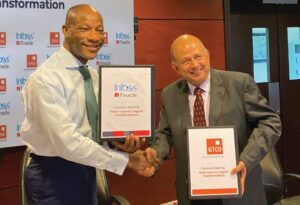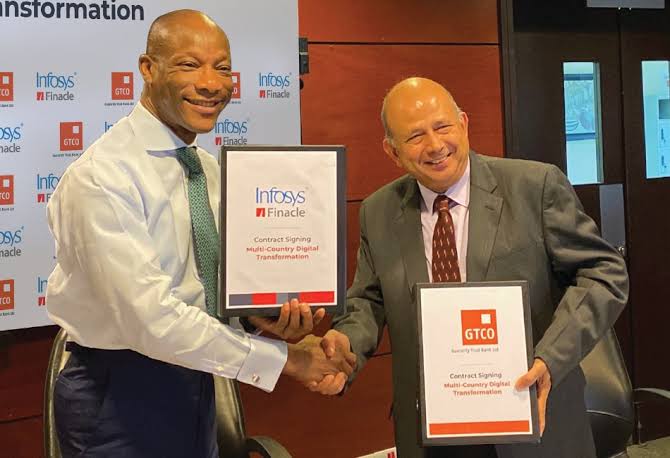Guaranty Trust Bank (GTBank), one of Nigeria’s leading banks, is in the final stages of switching its core banking software to Finacle, a system developed by Infosys. This change comes after the bank made history as the first Nigerian bank to report a half-year profit of ₦905.57 billion.

GTBank previously used a different banking software called Basis, which is also utilized by other Nigerian banks like Providus and SunTrust. However, GTBank decided to move to Finacle in September 2023 after some of its senior management and technology teams visited India to establish a direct partnership with Infosys, bypassing third-party vendors.
According to an insider, the shift was necessary because the old software had recurring problems, leading to occasional disruptions in service. Finacle was chosen because it can integrate all of GTBank’s banking and non-banking subsidiaries, such as its wealth management and pension services, into a single platform. This makes it a more streamlined and effective solution for the bank.
GTBank’s parent company, Guaranty Trust Holding Company (GTCO), decided to make this switch as part of a broader effort to improve its technology infrastructure. This aligns with GTCO’s ongoing plans to raise ₦400 billion in capital, announced by CEO Segun Agbaje in July 2024. Agbaje emphasized that upgrading the bank’s technology was crucial for maintaining its competitiveness and meeting the growing demands of its customers.
The transition to Finacle began in late 2023 and is being carefully managed to avoid disrupting the services of GTBank’s large retail customer base. One person familiar with the migration process said the bank is taking every step to ensure that customers experience minimal inconvenience.
A change in core banking software is a major undertaking for any bank and can lead to temporary service interruptions. For example, Sterling Bank, a smaller Nigerian bank, recently experienced an outage when it migrated to a new custom-built banking system, which left its customers unable to access the bank’s mobile app.
An industry expert likened this kind of transition to a “heart transplant” due to the complexity and the critical role core banking software plays in managing a bank’s operations and services. Any issues during the migration can impact the bank’s ability to serve its customers effectively, at least in the short term.
Finacle is already a popular choice in Nigeria, with at least 10 other banks using the software, including three of the country’s largest commercial banks. The software’s versatility and global reputation for reliability make it a leader in the core banking software market. The absence of a competitive local banking software provider has also helped solidify Finacle’s dominance in the Nigerian market.
GTBank has not publicly commented on the specifics of the transition, but the decision reflects a broader trend among Nigerian banks to upgrade their technology in response to the rise of digital banking. The success of this transition will ultimately be judged by how smoothly the migration goes and how well it improves customer service in the long run.
GTBank’s shift to Finacle is a strategic move aimed at enhancing its operations and ensuring that it stays at the forefront of banking technology in Nigeria. Customers can expect a more unified and reliable banking experience as the new system is fully implemented.




